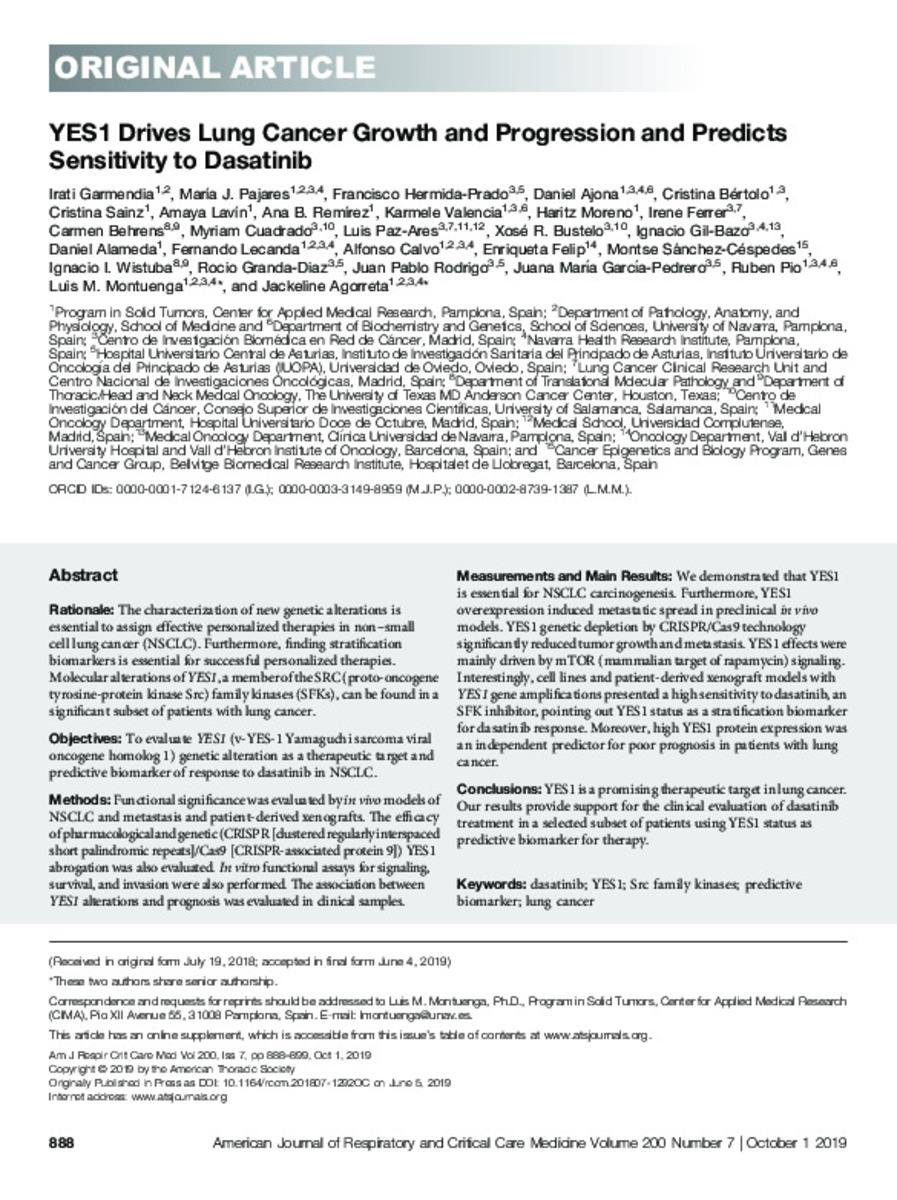Full metadata record
| DC Field | Value | Language |
|---|---|---|
| dc.creator | Garmendia, I. (Irati) | - |
| dc.creator | Pajares, M.J. (María José) | - |
| dc.creator | Hermida-Prado, F. (Francisco) | - |
| dc.creator | Ajona, D. (Daniel) | - |
| dc.creator | Bertolo, C. (Cristina) | - |
| dc.creator | Lavín, A. (Amaya) | - |
| dc.creator | Remirez, A. (Ana) | - |
| dc.creator | Valencia, K. (Karmele) | - |
| dc.creator | Moreno, H. (Haritz) | - |
| dc.creator | Ferrer, I. (Irene) | - |
| dc.creator | Behrens, C. (C.) | - |
| dc.creator | Cuadrado, M. (Myriam) | - |
| dc.creator | Paz-Ares, L. (Luis) | - |
| dc.creator | Bustelo, X.R. (Xose R.) | - |
| dc.creator | Gil-Bazo, I. (Ignacio) | - |
| dc.creator | Alameda, D. (Daniel) | - |
| dc.creator | Lecanda, F. (Fernando) | - |
| dc.creator | Calvo-González, A. (Alfonso) | - |
| dc.creator | Felip, E. (Enriqueta) | - |
| dc.creator | Sanchez-Cespedes, M. (Montserrat) | - |
| dc.creator | Wistuba, I.I. (Ignacio I.) | - |
| dc.creator | Granda-Díaz, R. (Rocío) | - |
| dc.creator | Rodrigo, J.P. (Juan P.) | - |
| dc.creator | García-Pedrero, J.M. (Juana M.) | - |
| dc.creator | Pio, R. (Rubén) | - |
| dc.creator | Montuenga-Badia, L.M. (Luis M.) | - |
| dc.creator | Agorreta, J. (Jackeline) | - |
| dc.date.accessioned | 2022-03-22T08:22:12Z | - |
| dc.date.available | 2022-03-22T08:22:12Z | - |
| dc.date.issued | 2019 | - |
| dc.identifier.citation | Garmendia, I. (Irati); Pajares, M.J. (María José); Hermida-Prado, F. (Francisco); et al. "YES1 drives lung cancer growth and progression and predicts sensitivity to dasatinib". American Journal of Respiratory and Critical Care Medicine. 200 (7), 2019, 888 - 899 | es |
| dc.identifier.issn | 1073-449X | - |
| dc.identifier.uri | https://hdl.handle.net/10171/63276 | - |
| dc.description.abstract | Rationale: The characterization of new genetic alterations is essential to assign effective personalized therapies in non–small cell lung cancer (NSCLC). Furthermore, finding stratification biomarkers is essential for successful personalized therapies. Molecular alterations of YES1, a member of the SRC (proto-oncogene tyrosine-protein kinase Src) family kinases (SFKs), can be found in a significant subset of patients with lung cancer. Objectives: To evaluate YES1 (v-YES-1 Yamaguchi sarcoma viral oncogene homolog 1) genetic alteration as a therapeutic target and predictive biomarker of response to dasatinib in NSCLC. Methods: Functional significance was evaluated by in vivo models of NSCLC and metastasis and patient-derived xenografts. The efficacy of pharmacological and genetic (CRISPR [clustered regularly interspaced short palindromic repeats]/Cas9 [CRISPR-associated protein 9]) YES1 abrogation was also evaluated. In vitro functional assays for signaling, survival, and invasion were also performed. The association between YES1 alterations and prognosis was evaluated in clinical samples. Measurements and Main Results: We demonstrated that YES1 is essential for NSCLC carcinogenesis. Furthermore, YES1 overexpression induced metastatic spread in preclinical in vivo models. YES1 genetic depletion by CRISPR/Cas9 technology significantly reduced tumor growth and metastasis. YES1 effects were mainly driven by mTOR (mammalian target of rapamycin) signaling. Interestingly, cell lines and patient-derived xenograft models with YES1 gene amplifications presented a high sensitivity to dasatinib, an SFK inhibitor, pointing out YES1 status as a stratification biomarker for dasatinib response. Moreover, high YES1 protein expression was an independent predictor for poor prognosis in patients with lung cancer. Conclusions: YES1 is a promising therapeutic target in lung cancer. Our results provide support for the clinical evaluation of dasatinib treatment in a selected subset of patients using YES1 status as predictive biomarker for therapy. | es_ES |
| dc.description.sponsorship | Supported by Fundaci ´on para la Investigaci ´on M ´edica Aplicada (FIMA), Spanish Ministry of Economy and Innovation and Fondo de Investigaci ´on SanitariaFondo Europeo de Desarrollo Regional grants 12/02040, PI13/00806, PI16/01821, PI16/00280, RTICC RD12/0036/0040, and SAF2015-6455-R; Centro de Investigaci ´on Biom ´edica en Red de C ´ancer grants CB16/12/00390, CB16/12/00390, CB16/12/00442, and CB16/12/00443; Asociaci ´on Espan˜ ola Contra el C ´ancer (AECC) Scientific Foundation grant GCB14-2170; Bristol-Myers Squibb (preclinical research agreement); AECC and a fellowship from the Basque Government (I.G.); the Castilla-Le ´on Government grant CSI049 U16 , the Ministry of Economy and Competitiveness grant SAF2015-64556-R , the Fundaci ´on Ram ´on Areces, Worldwide Cancer Research grant 14-1248 , and AECC Scientific Foundation grant GC16173472GARC (X.R.B.); and the Spanish Ministry of Science, Innovation and Universities (MCIU, RTI 2018-094507-B-100), La Caixa Foundation and Caja Navarra Foundation (F.L.). | es_ES |
| dc.language.iso | eng | es_ES |
| dc.publisher | American Thoracic Society | es_ES |
| dc.rights | info:eu-repo/semantics/openAccess | es_ES |
| dc.subject | Dasatinib | es_ES |
| dc.subject | YES1 | es_ES |
| dc.subject | Src family kinases | es_ES |
| dc.subject | Redictive biomarker | es_ES |
| dc.subject | Lung cancer | es_ES |
| dc.title | YES1 drives lung cancer growth and progression and predicts sensitivity to dasatinib | es_ES |
| dc.type | info:eu-repo/semantics/article | es_ES |
| dc.identifier.doi | 10.1164/rccm.201807-1292oc | - |
| dadun.citation.endingPage | 899 | es_ES |
| dadun.citation.number | 7 | es_ES |
| dadun.citation.publicationName | American Journal of Respiratory and Critical Care Medicine | es_ES |
| dadun.citation.startingPage | 888 | es_ES |
| dadun.citation.volume | 200 | es_ES |
Files in This Item:
Statistics and impact
Items in Dadun are protected by copyright, with all rights reserved, unless otherwise indicated.






